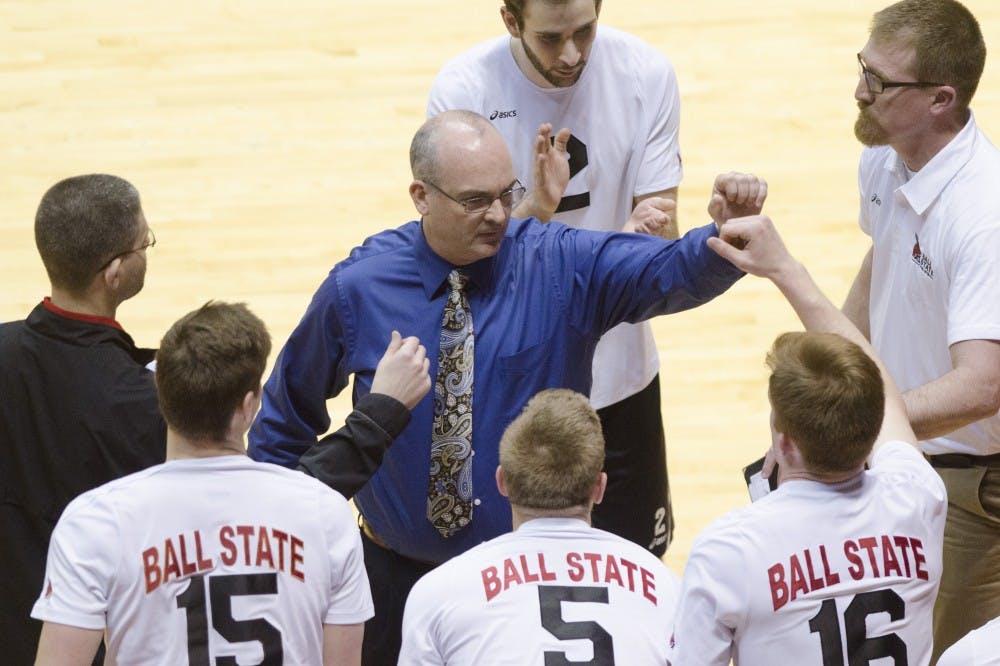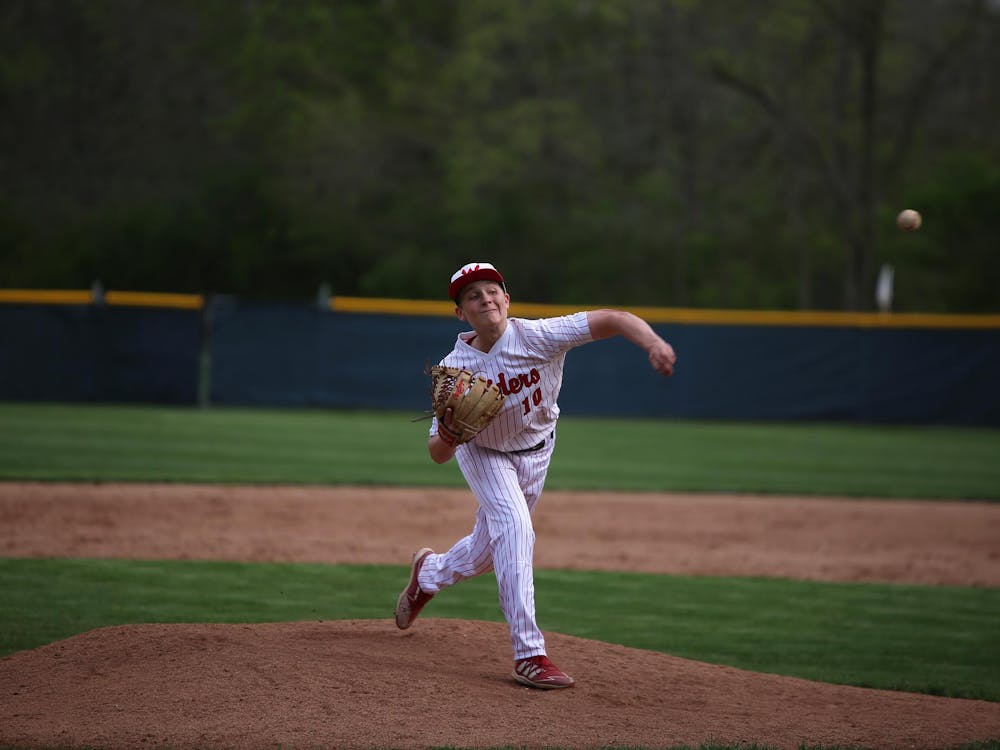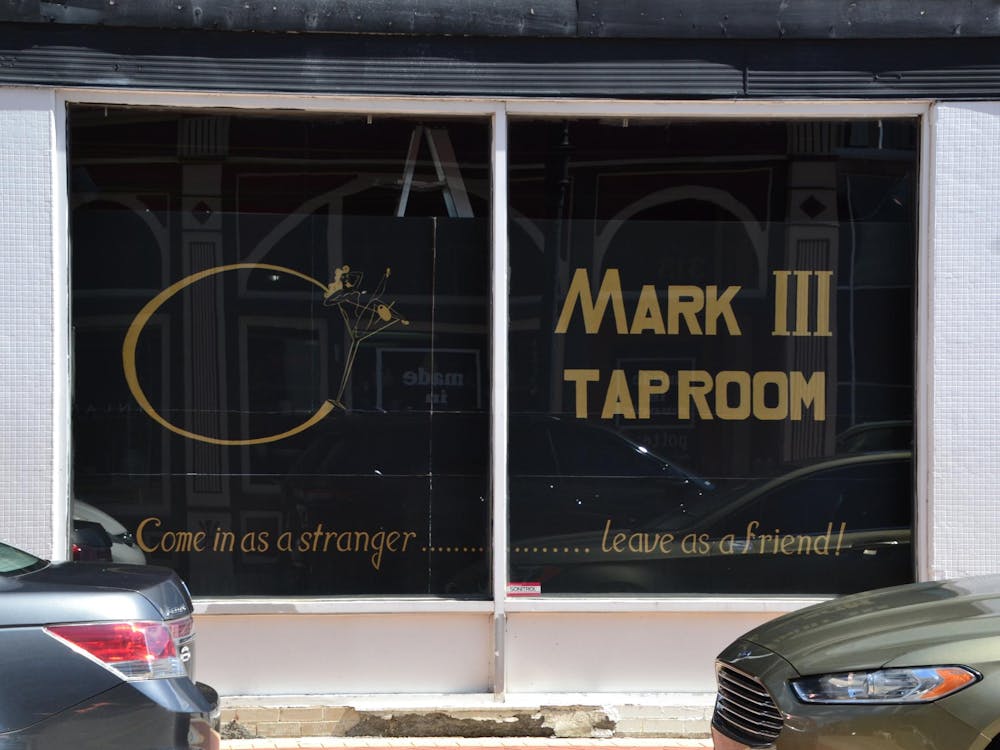There’s barely an inch of open space on Joel Walton’s desk, but most of the papers are neatly organized, laid out perfectly next to each other.
Pictures of his family adorn the back of the desk, while rings sit in cases in front of the pictures.
Newspaper clippings are scattered with some of the latest Ball State men’s volleyball match statistics next to them. On the wall behind them hang pictures of past Ball State teams Walton has coached.
Each one of them is a collection of lives he impacted on his way to 300 wins.
The wins don’t mean as much to him as the faces in the pictures, he said.
“I’ve been invited to weddings, and unfortunately, some funerals,” Walton said. “Reality is those will keep coming the longer I coach here.”
There’s little wall space left, much of it is covered in memories of grueling practices, elating wins and heartbreaking losses.
Three volleyballs sit high on the top shelf of Walton’s office. One is from his first win, a match against Mercyhurst University in 1999 when teams played to just 15 and points could only be won by the serving team.
The one next to it comes from win No. 200 when teams played to sets of 30. The final one sits in a glass case, win No. 250 when teams played to 25.
“These volleyballs are such a great representation of how the sport has evolved,” Walton said. “To still be here after so long, I’m truly blessed.”
Both Walton and the game he loves have changed in his 16 collegiate seasons.
Working his way up
After playing four years for the Ball State men’s volleyball team, Walton graduated with a business degree. He continued bagging groceries for Marsh supermarkets as he did throughout college.
Ball State initially hired Walton as a recruiting coordinator for Don Shondell, former head coach and founder of the men’s volleyball team.
Walton was named head coach for the men’s volleyball team in 1998, making him the third in program history. After 12 years of mentoring Walton, Shondell recommended him for the Ball State job.
The pair was athletic when they were younger and often played badminton and racquetball. Despite Walton’s youth and athleticism, Shondell still knew how to get under his skin.
“If I got to a point where I’d start to break away [in badminton], he’d start talking about practice or something,” Walton said. “He wasn’t calling a timeout, but he was breaking my momentum and I’m thinking, ‘I know exactly what you’re doing.’”
He said some of the competitiveness rubbed off on him.
When the two played tennis, Shondell didn’t allow Walton to serve because it was the only way the game would be fair. In racquetball, they would play to 21 and Shondell would give himself a 20-0 lead to start the game.
“All of a sudden, if I made a mistake, [Shondell is] up in my face saying, ‘Take that, fella, take that,’” Walton said, laughing. “That competitiveness filters down through me, through our players and through our program.”
Walton’s glasses rest on his nose, his head not fully covered with hair peppered black and white. He smiles as he tries to find the perfect words to describe Shondell, who still attends every Ball State men’s volleyball match.
“That man, he did a lot for me,” he said.
The Green Bomber
After the transmission went out in Kaitlin Walton’s car, Walton gave her his car for college in late January.
In return, Walton started driving the Green Bomber, a 2002 Mercury Villager that got him to and from his destination and little more.
It had wiring issues and mechanical problems, and it rattled and was falling apart. He drove it for a few weeks so his daughter could have a safer vehicle. Walton described himself as a family man, with a wife who works as a teacher along with two children, including Kaitlin, who plays volleyball.
They would put in roughly $500 to keep the car working, to keep him getting to Worthen Arena every day.
He’s one of the winningest coaches in Ball State history. But, he said he’s just one of three head coaches at Ball State not to have a car allowance.
“As a high school and college student, I thought life was supposed to be fair,” he said. “As a more mature adult, I’ve come to realize that it isn’t. Opportunities come when you work hard for them but only sometimes. … I’ve grown up a lot in terms of understanding how the world works.”
His players
After win No. 300 on Thursday, Walton posed with his players around him for a team picture and was given a small cake to commemorate the evening. The players made faces at the camera, gave him rabbit ears, showing the tight-knit bond they shared with their coach.
“I came in as a wild, wild kid,” senior outside attacker Larry Wrather said. “He’s helped me calm down and get me to the other side to level out the spectrum.”
It’s rare that Walton is seen losing his temper during a match, preferring a calm demeanor his players feed off.
His office will likely be the resting place for the picture of him and his team — an office that’s smaller than a dorm room.
Over the years, he’s coached numerous All-American players, been named the Midwestern Intercollegiate Volleyball Association Coach of the Year twice and had dozens of players receive All-Conference selections.
With the accolades he’s accumulated, the players are what matter to him.
“I look forward to going to work every day because I walk into the gym and there are guys who love what they’re doing,” he said. “Every year is a new puzzle to figure out and solve. I love the process.”
In 16 seasons at Ball State, he’s seen nearly everything imaginable on a volleyball court. When he smiles or frowns, wrinkles spread across his forehead. Some come from age, some from stress while trying to grow a sport that sees teams struggle to stay alive each season.
Walton won’t eat the cake because he gave up desserts for Lent. There will be no clinking of champagne glasses because he doesn’t drink.
He walked off the court a winner for the night, the same way he had 299 times in his past. He made no celebratory plans, as he’s not one to bask in personal glory. Besides, there are more important things to him.
He gets to see his team the next day.





